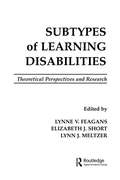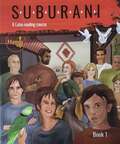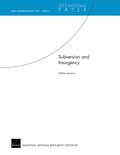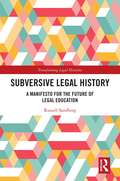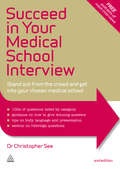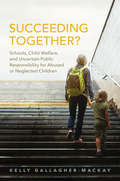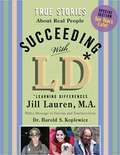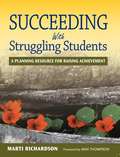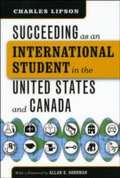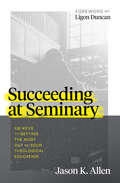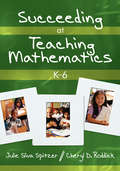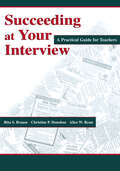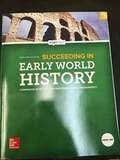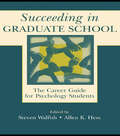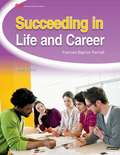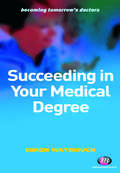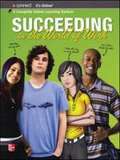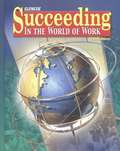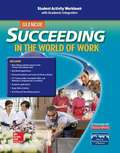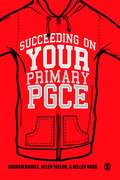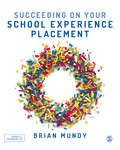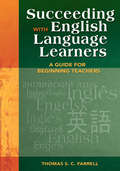- Table View
- List View
Subtypes of Learning Disabilities: Theoretical Perspectives and Research
by Lynn J. Meltzer Lynne V. Feagans Elizabeth J. ShortAlthough experts agree that various types of learning disabilities do exist, few attempts have been made to classify learning disabled children into subtypes. The editors of this collection feel that the lack of subcategorization has frustrated previous research efforts to obtain a generalizable body of knowledge in the field. To meet this critical need for definitive information, this book presents basic reviews and theoretical approaches used to subtype learning disabled children -- ranging from a behavior genetics approach to a dimensional approach. It also demonstrates actual research methods utilizing theoretical approaches.
Suburani
by Hands Up EducationExcerpt from the back cover: "It's the spring of AD 64 and, as dawn breaks over the Subura in Rome, a young woman calls from high in an apartment building to her aunt working in a bar below. While her father collects the rent from the other tenants, a falling tile narrowly misses a senator's son passing through the streets in a litter. Was it an accident? In the Subura, your life hangs by a thread.
Subversion and Insurgency
by William RosenauSubversion is a critical insurgent tool, but it has long been ignored by policymakers and analysts. This paper presents a set of case studies to explore the elements of subversion and discusses preliminary ideas for combating subversive activities in the context of the "long war" against violent Islamic extremism.
Subversive Legal History: A Manifesto for the Future of Legal Education (Transforming Legal Histories)
by Russell SandbergProvocative, audacious and challenging, this book rejuvenates not only the historical study of law and but also the role of Law Schools by asking which stories we tell and which stories we forget. It argues that a historical approach to law should be at the beating heart of the Law School curriculum. Far from being archaic, elitist and dull, historical perspectives on law are and should be subversive. Comparison with the past underscores: how the law and legal institutions are not fixed but are constructed; that every line drawn in the law and everything the law holds as sacred is arbitrary; and how the environment into which law students are socialised is a historical construct. A subversive approach is needed to highlight, question, de-construct and re-construct the authored nature of the law, revealing that that legal change on a larger scale is possible. Subversive Legal History is not a type of Legal History but is a characteristic. It describes a legal method that should not be the preserve only of specialist legal historians but rather should be part of the toolkit of all law students, teachers and researchers. The book will be essential reading for all who work and study in Law Schools, proposing a radical new approach not only to the historical study of law but to the content, purpose and ambition of legal education. A subversive approach can revolutionise Law Schools providing a more ambitious legal education which is grounded in the socio-legal reality, helping to ensure that today’s law students are better equipped to be the professionals and citizens of tomorrow.
Succeed in Your Medical School Interview
by Dr Christopher SeeAfter completing the medical school application comes the last, and often most challenging aspect of the school selection process; the interview. Notoriously hard to prepare for, it's difficult to know what to read, what questions might be asked and how to answer them. How to Succeed In Your Medical School Interview de-mystifies the interview process. It provides clear guidelines and a unique framework; giving you the relevant points to consider while crucially leaving conclusions open to express your own opinions and personality. It provides a systematic and methodical process which enables you to mine information from examiners, whilst demonstrating your academic ability. With a huge bank of questions covering all aspects of the interview spectrum, including a specific section of Oxbridge questions, you will learn how to prepare, how to present yourself and most importantly, what to say.
Succeeding Together?: Schools, Child Welfare, and Uncertain Public Responsibility for Abused or Neglected Children
by Kelly Gallagher-MackayGrowing attention has focused on the education of children in the child welfare system, particularly those in foster care, but ninety-two percent of children in the child welfare system stay with their parents and their educational needs receive little attention. Succeeding Together? is an institutional ethnography that analyses front-line accounts from mothers, teachers, and child welfare workers to explore the educational issues facing abused and neglected children outside of foster care. Kelly Gallagher-Mackay examines the complex policy framework and underlying assumptions that shape the practice of collective responsibility for this vulnerable group, shining a light on the implications of their status in-between private and public responsibility. Gallagher-Mackay breaks down collective responsibility into three areas: surveillance and the duty to report, child welfare’s poorly defined responsibility to provide educational supports, and the privatized nature of teachers’ professional responsibility for caring. The involvement of child welfare represents a public judgment that there should be strong, proactive, and coordinated intervention to ensure protection and well-being. Succeeding Together? reveals significant shortfalls in coordination and commitment to the well-being of society’s most vulnerable.
Succeeding With LD: True Stories About Real People With Ld
by Jill LaurenJill Lauren profiles amazing individuals who live with a learning disability and have effectively conquered their challenges to achieve success. These moving biographical sketches highlight the stories of a remarkable group of youth and adults who lead fulfilling lives because of their hard work, courage, and resilience. These inspiring people describe the resources they used to focus on their strengths and to persevere. Their poignant, real-life stories generate empathy and understanding in the community and stress the importance of a strong support network. First published in 1997, this new edition includes a 10-years later; update on each individual profiled.
Succeeding With Struggling Students: A Planning Resource for Raising Achievement
by Ms Marti T. RichardsonThis innovative resource presents program planning tools that can be customized for local school and district needs in planning effective interventions to benefit struggling students.
Succeeding as an International Student in the United States and Canada
by Charles LipsonEach year, 700,000 students from around the world come to the United States and Canada to study. For many, the experience is as challenging as it is exciting. Far from home, they must adapt to a new culture, new university system, and in many cases, a new language. The process can be overwhelming, but as Charles Lipson's Succeeding as an International Student in the United States and Canada assures us, it doesn't have to be. Succeeding is designed to help students navigate the myriad issues they will encounter--from picking a program to landing a campus job. Based on Lipson's work with international students as well as extensive interviews with faculty and advisers,Succeeding includes practical suggestions for learning English, participating in class, and meeting with instructors. In addition it explains the rules of academic honesty as they are understood in U. S. and Canadian universities. Life beyond the classroom is also covered, with handy sections on living on or off campus, obtaining a driver's license, setting up a bank account, and more. The comprehensive glossary addresses both academic terms and phrases heard while shopping or visiting a doctor. There is even a chapter on the academic calendar and holidays in the United States and Canada. Coming to a new country to study should be an exciting venture, not a baffling ordeal. Now, with this trustworthy resource, international students have all the practical information they need to succeed, in and out of the classroom.
Succeeding at Seminary: 12 Keys to Getting the Most out of Your Theological Education
by Jason K. AllenSeminary is an important step toward ministry—but only when you make the most of it.Many seminarians finish their education with regrets and missed opportunities. They feel spiritually drained, they never connected with their professors or colleagues, they are plagued with a long list of &“What Ifs?,&” and worry they wasted this time. And many, as they enter the ministry, discover gaps in their education and are left thinking, If only my seminary had taught me that.Prepare for your calling and make the most of your theological training with Succeeding at Seminary. Seminary president Jason K. Allen provides guidance for incoming and current seminary students on how to maximize their education experience. You&’ll learn how to select the right institution and weigh the pros and cons of online or in-person classes. You&’ll also receive tips for developing rapport with peers and professors and get insights for how to navigate a work, study, and family-life balance to help you survive the rigors of advanced theological learning. Seminary can offer the opportunities and education you need to flourish in ministry, but only if you are ready to make the most of it. With Succeeding at Seminary,you&’ll get the guidance and encouragement you need to maximize your seminary opportunity and excel in your calling.
Succeeding at Seminary: 12 Keys to Getting the Most out of Your Theological Education
by Jason K. AllenSeminary is an important step toward ministry—but only when you make the most of it.Many seminarians finish their education with regrets and missed opportunities. They feel spiritually drained, they never connected with their professors or colleagues, they are plagued with a long list of &“What Ifs?,&” and worry they wasted this time. And many, as they enter the ministry, discover gaps in their education and are left thinking, If only my seminary had taught me that.Prepare for your calling and make the most of your theological training with Succeeding at Seminary. Seminary president Jason K. Allen provides guidance for incoming and current seminary students on how to maximize their education experience. You&’ll learn how to select the right institution and weigh the pros and cons of online or in-person classes. You&’ll also receive tips for developing rapport with peers and professors and get insights for how to navigate a work, study, and family-life balance to help you survive the rigors of advanced theological learning. Seminary can offer the opportunities and education you need to flourish in ministry, but only if you are ready to make the most of it. With Succeeding at Seminary,you&’ll get the guidance and encouragement you need to maximize your seminary opportunity and excel in your calling.
Succeeding at Teaching Mathematics, K-6
by Dr Cheryl D. Roddick Julie A. Sliva SpitzerThis invaluable resource helps beginning educators focus on the big ideas in teaching mathematics and promote student engagement.
Succeeding at Teaching Secondary Mathematics: Your First Year
by Dr Cheryl D. Roddick Julie A. Sliva SpitzerThis practical resource helps beginning secondary mathematics teachers design a curriculum that is meaningful, differentiate instruction, engage students, meet standards, assess student understanding, and more.
Succeeding at Your Interview: A Practical Guide for Teachers
by Rita S. Brause Christine P. Donohue Alice W. RyanSucceeding at Your Interview: A Practical Guide for Teachers uses an effective interactive format to present core information about interviewing for a teaching job, document a wide variety of interview processes, guide teacher candidates in developing strategies for interviewing, and increase their confidence in communicating their professional knowledge. In a spiral process, readers are asked to consider scenarios, respond to questions, contemplate the perspective offered by the authors, and modify their responses. The goal is to help teacher candidates develop and articulate a clear idea of their own professional knowledge and of the culture of the schools at which they are interviewing. Special features: *Eleven detailed chapters and five interview scenarios engage the reader in continuous reflective practice in the multifaceted activities integral to interviewing--beginning with organizing the job search and proceeding through the entire interview process. *The scenarios implicitly develop knowledge and the chapters explicitly detail the information. *Specific interview situations engage readers in articulating their professional knowledge, linking theory and practice. *"Keep in Mind" comments, Margin Notes, and Decision Trees provide opportunities to reflect on the issues and develop personal responses. *Sample documents, formats, questions, and responses enhance understanding of evaluation processes. *Graphic organizers at the beginning and end of each chapter provide visual representations of the concepts and concerns addressed in each chapter, assisting the reader in identifying chapters relevant to their current needs in the job search and in synthesizing, organizing, and reviewing the information contained in the chapter.
Succeeding in Early World History: Companion Work Text for Mastering Florida Assessments
by McGraw Hill EducationMcGraw-Hill networks: A Social Studies Learning System combines print resources grounded in solid pedagogy with a full suite of teaching and learning tools for a flexible, customized learning experience. Focus on the Essential Questions with an accessible student text built around Enduring Understanding and NCSS Standards. Bring the stories of the ages to life with with The Story Matters chapter openers, Biography features, Step Into Place maps and Step Into Time timelines. Maximize comprehension with built-in reading strategies, vocabulary support, Visual Literacy activities, and Guided Questions. Build critical thinking and historical analysis skills with Thinking Like a Historian, It Matters Because, What Do You Think, and Connections to Today. Customize the learning experience with differentiated instruction, leveled reading, customizable assessments and worksheets, and flexible online learning tools. Connect to core World History content with an accessible, student-friendly text built on the principles of Understanding by Design. - Publisher.
Succeeding in Graduate School: The Career Guide for Psychology Students
by Allen K. Hess Steven WalfishPsychology students who want to continue their education today are confronted by a bewildering variety of possibilities. Succeeding in Graduate School offers them much needed practical help. Written by experienced mentors, this book: *explains the options provided by a bachelor's degree, describes what each of the many available programs at the master's and doctoral levels prepares one to do, helps in selecting the most appropriate program, and enhances one's chances of being admitted; *gives reader-friendly tutorials in teaching, research, and clinical/consulting skills; *describes the stresses of life as a graduate student; *suggests ways to cope with the management of difficult professors, the search for the optimal advisor-mentor match, and other political and emotional problems that can make or break a graduate career; *offers advice on overcoming obstacles to completing a thesis or dissertation; and *provides guidance on navigating beyond graduate school: maintaining one's ethical focus, getting into and completing the internship that is a requirement of many programs, obtaining a license for those requiring one to work, and in general, building a career beyond the degree. Clear, crisp, and comprehensive--with extensive references for further exploration--Succeeding in Graduate School is must reading for undergraduates and graduate students alike.
Succeeding in Life and Career: Foundations Of Human Studies
by Frances Baynor ParnellNIMAC-sourced textbook
Succeeding in Your Medical Degree (Becoming Tomorrow's Doctors Series)
by Simon WatmoughStudents may not be aware of it but Tomorrow’s Doctors (2009) will have a significant impact on their undergraduate medical education. Aimed at new medical students, this book highlights the key themes in UK medical education and how the recommendations in Tomorrow’s Doctors will affect their education and subsequent career. Covering topics such as professionalism, leadership, medical informatics and peer tutoring in addition to more familiar areas such as assessment, student-selected components, simulation and clinical attachments, this book will help medical students to understand the course they are embarking on and, ultimately, to succeed at becoming doctors.
Succeeding in the World of Work
by Grady KimbrellThe text that explores career options and life choices. . . and how to succeed! Succeeding in the World of Work prepares your students for the complex issues they'll face in the rapidly changing workplace. This updated and comprehensive program now includes 16 Career Pathways outlined by the U. S. Department of Education.
Succeeding in the World of Work (7th edition)
by Grady Kimbrell Ben S. VineyardThis updated and comprehensive program prepares students for the complex issues they'll face in the rapidly changing workplace.
Succeeding in the World of Work: Student Activity Workbook
by Glencoe McGraw-Hill StaffIncludes: note-taking activities based on the Cornell note-taking model, real-world applications, personal academic and career portfolio activities, 21st century skills, foundation skills, and workplace competencies correlations, academic applications, study skills activities, test-prep and test-taking practice.
Succeeding on your Primary PGCE
by Graham Birrell Helen Taylor Hellen WardStudying for a Primary Postgraduate Certificate in Education (PGCE) can be demanding, but this book will help you to succeed on this intensive and challenging course. By showing you how to make the most of your time on the PGCE, the book encourages you to take a positive and proactive approach to your studies, and to reflect on and learn from your experiences. Packed with advice on how to make the most of your lectures, tutorials, assignments, placements and time spent with teachers, the book highlights the need for reflection, professionalism and strong personal commitment if you are to become a good teacher. Designed to help you throughout the course, chapters cover: - using the time before you start the course to get a head start - making the most of your time on placements - being reflective - developing your own personal philosophy for teaching - applying for, and getting, your first job This is an indispensible guide for those embarking on a Primary PGCE, and offers those considering applying for the course an invaluable insight into what to expect and how to get onto a PGCE. The advice is based on the authors′ successful work with thousands of trainee teachers over many years, and there are case studies of successful students and students who struggled. This book is a lifeline for those working hard towards the ultimate goal of becoming a great teacher.
Succeeding on your School Experience Placement
by Brian MundyThis book is designed to help you through one of the most important aspects of your pre-service teacher education: your school experience placements. Highly practical and accessible, it gives guidance on what happens before, during and after placement, and provide you with strategies on how to deal with the issues that you will encounter in school, including classroom management, lesson planning and catering for individual differences. Each chapter includes: · Relevant AITSL standards that are being addressed · Key terminology that you’ll need to familiarise yourself with · Essential questions that encourage discussion of teaching practice · Frequently asked questions by pre-service teachers with potential responses · Placement scenarios that offer valuable learning opportunities The book is also supported by 30+ downloadable lesson plan and classroom-ready templates.
Succeeding on your School Experience Placement
by Brian MundyThis book is designed to help you through one of the most important aspects of your pre-service teacher education: your school experience placements. Highly practical and accessible, it gives guidance on what happens before, during and after placement, and provide you with strategies on how to deal with the issues that you will encounter in school, including classroom management, lesson planning and catering for individual differences. Each chapter includes: · Relevant AITSL standards that are being addressed · Key terminology that you’ll need to familiarise yourself with · Essential questions that encourage discussion of teaching practice · Frequently asked questions by pre-service teachers with potential responses · Placement scenarios that offer valuable learning opportunities The book is also supported by 30+ downloadable lesson plan and classroom-ready templates.
Succeeding with English Language Learners: A Guide for Beginning Teachers
by Thomas S. FarrellNovice teachers can apply best practices for a successful ELL classroom experience! New teachers face a special challenge when their first assignment is teaching English language learners. This resource combines teacher induction and mentoring principles with basic ESL and EFL techniques to enhance reading, writing, speaking, listening, and grammar instruction. More than 100 exploratory breaks provide topics for reflective discussion with mentors and supervisors. Each chapter offers novice teachers supportive strategies for: Using different models of lesson planning Monitoring behavior and classroom interaction Assessing students for placement in ESL or general education classes Reflecting and exploring the development of their own teaching practice
